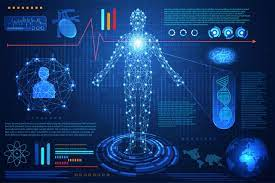
Artificial Intelligence (AI) - GenNext technology in healthcare
By: Mrs. Sonali Munj
Assistant Professor (Department of Pharmaceutical Chemistry)
Vivekanand Education Society's College of Pharmacy
AI has been a booming word these days. Now it’s no stranger to the users yet its optimum usage is yet to be identified. Below are the few points that can be utilized in the healthcare.
AI, or Artificial Intelligence, refers to computer systems designed to perform tasks that typically require human intelligence. These tasks include learning, reasoning, problem-solving, perception, and language understanding. AI, in simple terms, is like giving computers the ability to think and learn, like how humans do. It helps machines perform tasks intelligently, such as recognizing speech, understanding images, or making decisions, without explicit programming for each task.
AI has been a topic of debate for everyone because of its equal portion of pros & cons. Talking about its impact on the healthcare industry, it has completely revolutionised the dynamics of the healthcare landscape in India.
AI has progressed in many sectors impacting the respective industry to huge extent. To enlist the few, it includes Healthcare sector with Diagnostics, personalized medicine and drug discovery. In Finance section it helps in Fraud detection, algorithmic trading and customer service. Education section can foresee a remarkable change with AI’s assistance as teachers can cater to individual needs, promote student engagement, and improve learning outcomes. In retail sector it manages voluminous data of Inventory and recommendation systems. Content writing and Gaming with AI is capturing market to great for entertainment. It covers Marketing field for Targeted advertising and customer segmentation. In manufacturing it is used for Predictive maintenance and quality control. In agriculture it is used as a predictive tool for Precision farming and crop monitoring. Many of us must have witnessed its presence in Customer Service sector which includes Chatbots, virtual assistants.
How AI is used in Diagnostics?
In diagnostics, AI is used to enhance accuracy and efficiency in various ways:
• Medical Imaging: AI analyzes medical images, such as X-rays, MRIs, and CT scans, to detect abnormalities, tumors, or other conditions. These speeds up the diagnostic process.
• Pathology: AI aids pathologists by analyzing histopathology slides, helping to identify and classify diseases at a microscopic level.
• Clinical Decision Support: AI systems provide insights and recommendations to healthcare professionals based on patient data, aiding in diagnosis and treatment planning.
• Genomic Analysis: AI helps analyze genomic data to identify genetic markers associated with diseases, enabling personalized and targeted treatment approaches.
• Monitoring and Predictive Analysis: AI monitors patient data in real-time, identifying patterns and predicting potential health issues before they escalate.
By leveraging AI in diagnostics, healthcare providers can improve accuracy, reduce diagnostic errors and enhance the overall efficiency of the healthcare system.
Lets take an example to understand the significance of AI in detection of tumor. The simplified overview of process starts with Data Collection of Medical images, such as X-rays, MRIs, or CT scans from patients. The images undergo preprocessing to enhance quality and remove any irrelevant information or noise. A machine learning model is trained using a large dataset of labelled medical images. The labels indicate whether a tumor is present or not. The AI model learns to recognize patterns and features indicative of tumors in the training data. This could include size, shape, and texture characteristics. The trained model is tested on new, unseen medical images to validate its ability to accurately detect tumors.Once validated, the AI model can be deployed to analyze new patient images in real-time.
The AI algorithm examines the patterns in the medical images and identifies potential tumors based on the features it learned during training. This process allows AI to assist radiologists in detecting tumors more efficiently and accurately, potentially leading to earlier diagnoses and improved patient outcomes. Similarly in cardiovascular healthcare, Microsoft’s AI Network for Healthcare is developing a machine learning model to predict heart attack risk. Using clinical and lab data from more than 4 lakh patients, the AI solution can identify new risk factors and provide a heart risk score to patients without a detailed health check-up, enabling early disease detection.
Role of healthcare professionals
As the technology is bringing great revolution in the healthcare profession, healthcare professionals in India play a crucial role of integrating AI to healthcare and thus serving as a bridge between AI technologies and patientcare ensuring responsible and patient centric integration of AI in healthcare practices. These professionals are working with AI developers to ensure the design and implementation of AI systems align with clinical needs and standards.
As the technology advances, it is the primary task and duty of healthcare professionals to be trained in using AI tools effectively and staying updated on advancements to maximize their benefits. As the decisions are banking on results provided by AI tool, interpretating and examining AI-generated insights to the best and incorporating them into patient care decisions ensures a holistic approach that combines AI assistance with clinical expertise.
Professionals working with AI tool pose challenges to address ethical issues related to AI, including patient privacy, informed consent, and fair and unbiased use of AI algorithms. Regularly assessing AI system performance and accuracy to maintain high standards of patient care and safety requires continuous monitoring by healthcare professionals.
The Way Forward
AI has the ability to completely change the way healthcare is provided by advancing diagnoses, better treatment outcomes, and altering how medical professionals now provide care. As AI technologies develop, they are proving to be useful resources for saving lives, enhancing patient outcomes, and streamlining medical procedures.
However, it is crucial to remember that AI is not intended to take the position of healthcare personnel. Instead, technology acts as a strong instrument to improve their abilities, offer information, and help them make decisions. To ensure ethical use, data privacy, and patient safety, the successful integration of AI in healthcare is needed, along with cooperation between healthcare providers, technology developers, and regulatory organizations.
While the government has integrated an AI-based curriculum into the school education system under the National Education Policy 2020, additional initiatives are needed for students, medical professionals, the general public, and policymakers. Collaborative efforts between healthcare organizations, academic institutions, and government bodies are also essential to promote understanding of the role of AI. These partnerships can bridge the gap between AI expertise and medical domain knowledge, leading to the development of more effective AI tools.
As per the reports the provision for continuous monitoring of patient’s health is only available in ICU. The count says only 1 Lakh beds are present in ICU as compared to all other 20 Lakhs bed. With AI, it is postulated that there would be a significant reduction in the cost incurred and the doctor’s efficiency would be multiplied many a times.
Hence AI will add more meaning to the treatment and enhance standard of care of patients. We can foresee the era of AI in the near future with advancement in technology.
 022 – 6114 4144
022 – 6114 4144 vescop@ves.ac.in
vescop@ves.ac.in